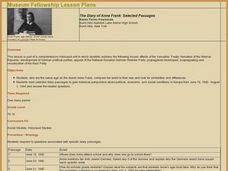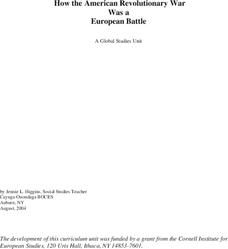Curated OER
Germans and Irish in Augusta and Franklin Counties
High schoolers examine 19th century newspapers, a last and testament, and census manuscripts to analyze the Irish and German immigrant communities in the 1850s and 1860s. They write a letter from the perspective of an Irish or German...
Curated OER
A Series of Intolerable Events
Eighth graders investigate the events that led to World War II. In this Holocaust lesson, 8th graders research primary and secondary sources about the events that led to the war. Students create PowerPoint presentations that provide...
Curated OER
Food Choices: A Socio-Cultural Decision
Students discuss their food preferences. Using a flannel board and food models students describe what they would like to eat for dinner. Students compare their selections with their classmates. Students identify the nationality of ethnic...
Curated OER
Rethinking Perpetrators, Bystanders and Rescuers: The Case of Max Schmeling
The focus of this lesson is personal choice and how changing circumstances can affect one person's ethical choices. During the Holocaust, people made choices, and by placing individuals in the appropriate historical context students can...
Curated OER
The Diary of Anne Frank: Selected Passages
Students read the novel, "The Diary of Anne Frank". Using the internet, they gather information on the effect of the Versailles Treaty, formation of the Weimer Republic and the Nazi Party on the Holocaust. They view propaganda...
Curated OER
Creepy, Crawly Critters
Young scholars study characteristics of insects by creating models from an assortment of materials. They create rubrics showing what an insect must have and create an insect, using a bag of materials. They cut out the puzzle insects...
Curated OER
Nim: A Game Played All Over the World
Pupils participate in a European subtraction game. In this subtraction lesson, students use pebbles to demonstrate different subtraction strategies. The pupils use a deduction strategy to be the first one left with no pebbles.
Curated OER
American Revolution: A European Battle
Learners create a timeline of events during the Revolutionary War and conduct research of historical figures. They construct acrostics or diamantes of the figures' names. They evaluate the involvement of Europeans in the war.
Curated OER
Famous Olympians
Students study about famous Olympic athletes. They are introduced to a few that have earned gold medals to encourage interest. Students read to find out more about them to become with more equally famous Olympic Games stars.
Curated OER
Let's Go To The Movies
Students explore technology used in making movies. In this movie making lesson plan, students investigate how technology has improved in the entertainment industry. Students discover how simple tools are combined together to make complex...
Curated OER
National Gallery of Art: Prinz Friedrich von Homburg: Ein Schauspeil, 3x
Students explore the work of Frank Stella. For this art appreciation lesson, students look at images of the sculpture Prinz Friedrich von Homburg: Ein Schauspeil, 3x and discuss it as a work of art. This lesson includes two simple...
Curated OER
Who Was Here?
Learners explore how their community has also had various waves of immigration over the years. It asks students to visit a local cemetery and examine the names and dates on the headstones to find evidence of who lived in the community...
Curated OER
Rethinking Perpetrators, Bystanders, and Rescuers: The Case of Max Schmeling
Students examine the life and actions of Max Schmeling during World War II. They read and analyze an article, compare/contrast Schmeling's choices with other people during this time period, and write a journal response.














